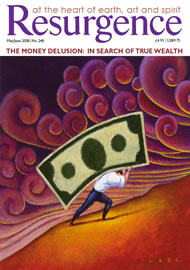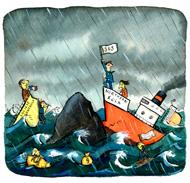WE HAD THOUGHT that the collapse of Enron was a one-off financial hiccup and that otherwise our money system was safe and sound in the hands of the market. However, this doesn’t seem to be the case. The credit crunch and sub-prime mortgage lending crises have brought much misery to many in the US as well as in the UK. Prestigious and solid-looking banks such as Société Générale, Northern Rock and Bear Stearns have exposed the underlying weakness of our money system. These examples may be only the tip of the iceberg of the hidden instability of the money market.
In the wake of such financial turmoil one can only conclude that the world’s money system is in need of an overhaul. The system, which was created to facilitate economic transactions, is now creating economic tragedies. What was a measure of wealth has taken the place of wealth itself. What was a means to an end has now become an end.
Let us be clear. Money is not wealth. It is a delusion to think that money is wealth. True wealth is good land, healthy animals, flourishing forests, clean water, honest work, abundant creativity and human imagination. Money was designed to oil the wheels of economic interaction and to ensure that the workings of the marketplace were smooth and simple.
The purpose of money was and should be to serve the human community as well as the Earth community. However, it appears that the original purpose has now been reversed. Instead of money serving people and planet, now people and the planet are put into the service of money. Natural resources are converted into consumables to make money. Whether these consumer goods are necessary or not is irrelevant. As long as money is made, all and everything is justified; the money machine has to be kept in motion at all costs.
Of course, most of the money supply is controlled by the few; it may appear that there is never enough money to go round, but in fact there is plenty of money available to those who already have it. Yet, for the have-nots, there is always a great scarcity. For example, there is never a shortage of money for wars and weapons, but it is always in short supply for arts and education. There is not a lack of money for fashion, but never enough for food for the poor. No-one needs to ask where the money will come from to build huge buildings for banks, supermarkets, office blocks, shopping centres and luxury villas but there is never enough money to build houses for the poor.
Naturally, there is a hierarchy in money; some currencies are more valuable than others: the dollar dominates, the rouble is subordinate. If you have euros, pounds and yen you are privileged, but if you have only rupees, dinar and pesos you are powerless. You have to give 100 rupees to get £1! When you buy something with the dinar you need a hundred times more than you would in dollars and if you sell something you receive a hundred times less. If you work for a British bank in the UK, your earnings are likely to be a hundred times greater than if you do the same job for the same bank in India. This is why call-centres have sprung up in poorer countries.
If you produce Nike shoes in Bangladesh you are paid 100 times less than if you were producing the same pair of shoes in the US. Thus money is an instrument of injustice and exploitation, not merely a means of exchange.
Money favours power and power favours money. Modern ‘democracy’, in most countries, is the government of the rich for the rich and by the rich. It is estimated that this year’s US elections will cost $1billion; money speaks louder than policies or personalities.
As John F. Kennedy once said, “What is designed by humans can be changed by humans.” Money is not a god-given fixture: it was designed by us, therefore it can be changed by us. Unless we reform and redesign our money system the idea of sustainability, social justice and spiritual renewal will remain a mirage. Therefore the reform of the money system is an urgent imperative.
We will have to develop local currencies, parallel to centralised national and international currencies of the world. We will have to revive our gift economy to solve the problems of the money economy. This is the theme of the special feature on money in this issue. James Bruges, Colin Tudge, Peter Lang and Tarek El Diwany expose the money delusion and explore the alternatives. Let us hope that the environmental movement makes money reform an essential part of its work.
SATISH KUMAR








